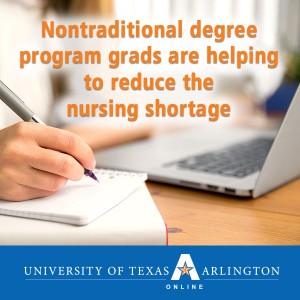
Nontraditional students are helping to reduce the nursing shortage
The nation’s nursing shortage, intensified by an increased demand for quality healthcare, continues to be a pressing issue. The nursing shortage in Texas mirrors the national trend. According to a Texas Health & Human Services Commission report, by 2030, the job opportunities for registered nurses will increase by 9 percent, but posted job openings and vacancies are taking an average of 6 months to fill.
Nontraditional students — those characterized as older who often work or care for families — are helping close this critical gap. According to an article in Medscape Medical News, colleges around the country, like the University of Texas at Arlington, are forging a path forward so nontraditional students can earn pursue an online Bachelor of Science in Nursing (BSN) program faster and easier.
What Defines a Nontraditional Student?
Nontraditional nursing students are the new norm not just in Texas but nationwide. More students than ever are approaching nursing as a second career. In addition, there has been an increase in the percentage of nursing school students and nurses with non-nursing degrees — majors include liberal arts, humanities, business and other health majors. In 2022, the percentage of nursing students with previous degrees sat at 37 percent.
Nontraditional students are a critical part of filling nursing shortages because they have a lot to contribute to patients and the profession, including life experience and maturity. Those who choose nursing as a second career want to contribute something meaningful to society.
Why an Online BSN Program Is Ideal for Nontraditional Students
Nursing is perhaps one of the best options for nontraditional students or professionals seeking second careers. It offers stability, competitive pay and challenging work. Earning a BSN degree has many advantages, including increased marketability. According to the United States Bureau of Labor Statistics, those with a BSN will have better job prospects than those without.
An online BSN program is ideal for nontraditional students because of its flexibility, which is often important for older students. Equally important is how the school accommodates nontraditional students. The University of Texas at Arlington is proactive in accommodating the special needs of nontraditional students.
An increasing number of nontraditional students are entering nursing school and choosing nursing as a second career. They are necessary to decreasing the severity of the nursing shortage in Texas and the nation. A BSN offers increased job stability, career growth and higher earning potential compared to associate-prepared RNs.
Learn about the UT Arlington online BSN program.